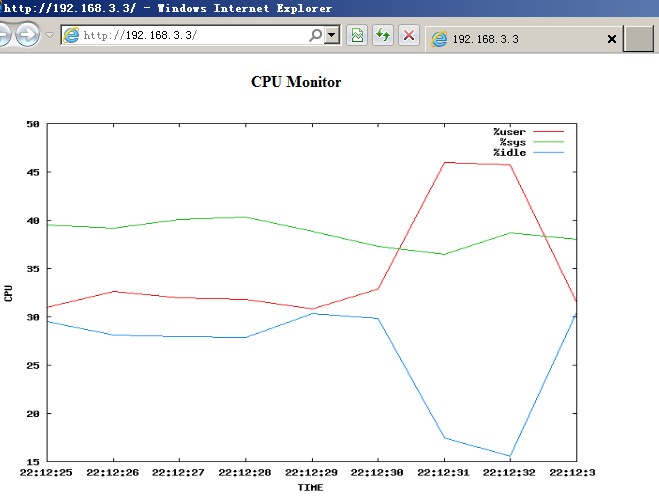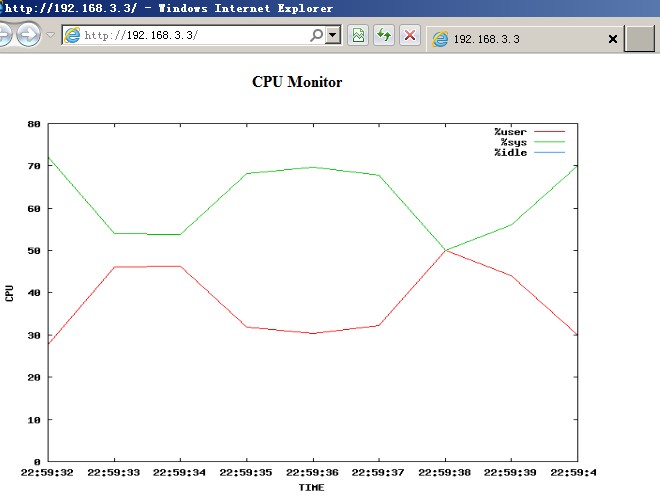现在有很多著名的监控程序,比如Cacti,Nagios,Ntop,Smoking等,绘图是监控程序中最重要的组成部分,通过图像可以更加直观的反映出系统的网络流量,硬件负载等,从而减小了运维的工作量,其中rrdtool就是一款主流的绘图工具,Cacti就是用rrdtool来绘图的,之前我也有单独用rrdtool绘制过Oracle的性能图(PS:可以查阅我以前的博文),此外Gnuplot也是我个人比较喜欢用的一款绘图工具,用它可以灵活的绘制出各种监控图,用于自己编写的系统监控平台。以下我把自己在生产中的使用的监控平台简化后与大家分享。
首先用sar命令,sar是一个很强大的系统监控命令,这里我用它里获取系统的性能数据。
-u参数是报告CPU的使用情况,1指的是每秒报告一次,10指的是十次
[root@oracle ~]# sar -u 1 10
Linux 2.6.18-194.el5 (oracle.example.com) 03/09/13
22:18:16 CPU %user %nice %system %iowait %steal %idle
22:18:17 all 30.35 0.00 41.29 0.00 0.00 28.36
22:18:18 all 30.26 0.00 39.49 0.00 0.00 30.26
22:18:19 all 31.50 0.00 38.50 0.00 0.00 30.00
22:18:20 all 41.50 0.00 38.50 0.00 0.00 20.00
22:18:21 all 33.50 0.00 39.50 0.00 0.00 27.00
22:18:22 all 30.00 0.00 39.50 0.00 0.00 30.50
22:18:23 all 41.71 0.00 38.19 0.00 0.00 20.10
22:18:24 all 37.00 0.00 39.50 0.00 0.00 23.50
22:18:25 all 32.16 0.00 38.19 0.00 0.00 29.65
22:18:26 all 33.67 0.00 39.70 0.00 0.00 26.63
Average: all 34.17 0.00 39.24 0.00 0.00 26.59
由上面的输出可以看到,数据中有无用的数据行,可以将数据稍加筛选后重定向到monitor.data文件中
[root@oracle html]# sar -u 1 10 | head -n -2 | tail -11 | grep . > /var/www/html/monitor.data
[root@oracle html]# cat monitor.data
22:29:39 CPU %user %nice %system %iowait %steal %idle
22:29:40 all 36.70 0.00 40.07 0.00 0.00 23.22
22:29:42 all 44.65 0.00 41.86 0.00 0.00 13.49
22:29:43 all 33.50 0.00 39.50 0.00 0.00 27.00
22:29:44 all 31.66 0.00 40.20 0.00 0.00 28.14
22:29:45 all 31.98 0.00 39.09 0.00 0.00 28.93
22:29:46 all 31.16 0.00 38.69 0.00 0.00 30.15
22:29:47 all 42.57 0.00 38.61 0.00 0.00 18.81
22:29:48 all 33.85 0.00 40.51 0.00 0.00 25.64
22:29:49 all 31.66 0.00 38.19 0.00 0.00 30.15
当把数据完整的整理到monitor.data文件后,就开始编写Gnuplot的配置文件monitor.conf
[root@oracle html]# vim monitor.conf
set term png
set xdata time
set style data lines
set output 'cpu.png'
set timefmt '%H:%M:%S'
set format x '%H:%M:%S'
set xlabel 'TIME'
set ylabel 'CPU'
plot 'monitor.data' using 1:3 title "%user", 'monitor.data' using 1:5 title "%sys", 'monitor.data' using 1:8 title "%idle"
最后可以写个Shell脚本文件,把生成数据和图片的两步结合在一起,这里我就写一行吧
[root@oracle html]# vim monitor.sh
#!/bin/sh
sar -u 1 10 | head -n -2 | tail -11 | grep . > /var/www/html/monitor.data && gnuplot /var/www/html/monitor.conf [root@oracle html]# chmod +x monitor.sh
最后通过计划任务让操作系统每分钟执行一次脚本monitor.sh
[root@oracle html]# crontab -e
*/1 * * * * /var/www/html/monitor.sh
写一个简单的html页面测试,其中可以用javascript来实现页面自动刷新功能
<html>
<body>
<tablewidth="600"border="0"cellpadding="3"cellspacing="0">
<tr>
<td><strong><center>CPU Monitor</center></strong></td>
</tr>
</table>
<br>
<p><imgsrc="cpu.png"width="600"height="380"></p>
</body>
<scriptlanguage="JavaScript">
function refresh(){
window.location.reload();
}
setTimeout('refresh()',1000);
</script>
</html>
访问监控页面http://192.168.3.3可以看到,这是把过去10秒钟系统CPU使用情况的数据绘制成了监控图

可以做一个增加系统CPU负载的测试,执行命令 cat /dev/zero > /dev/null, 监控页面是每秒钟刷新一次,稍等一会就会自动刷新出下图

如图所示,可以很明显的发现表示CPU idle值的蓝线已经消失,说明在这个时间段内系统的CPU负载很高。
以上只是一个简单的自制监控系统,在实际生产中可以通过php,mysql,shell脚本配合编写具有查询、分析、导出等功能更加强大的监控平台。欢迎大家给我留言交流!谢谢!
